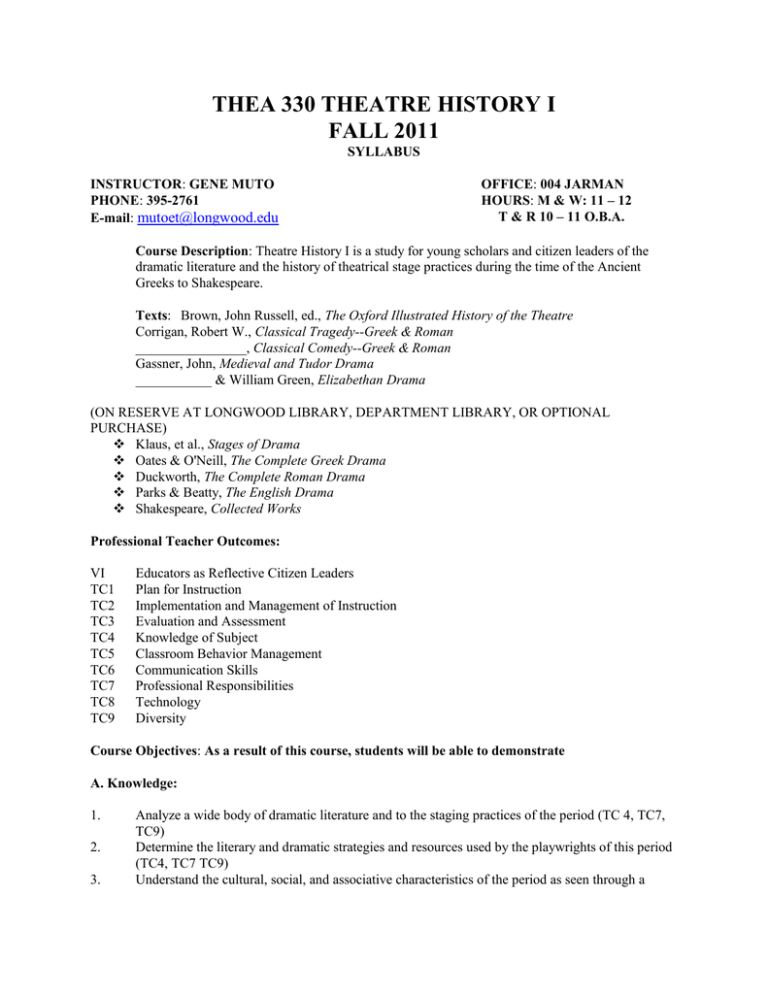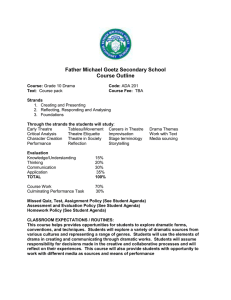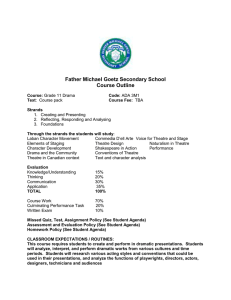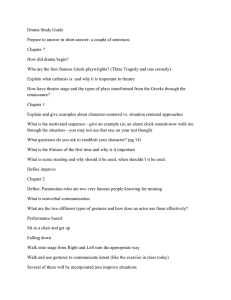THEA 330
advertisement

THEA 330 THEATRE HISTORY I FALL 2011 SYLLABUS INSTRUCTOR: GENE MUTO PHONE: 395-2761 E-mail: mutoet@longwood.edu OFFICE: 004 JARMAN HOURS: M & W: 11 – 12 T & R 10 – 11 O.B.A. Course Description: Theatre History I is a study for young scholars and citizen leaders of the dramatic literature and the history of theatrical stage practices during the time of the Ancient Greeks to Shakespeare. Texts: Brown, John Russell, ed., The Oxford Illustrated History of the Theatre Corrigan, Robert W., Classical Tragedy--Greek & Roman ________________, Classical Comedy--Greek & Roman Gassner, John, Medieval and Tudor Drama ___________ & William Green, Elizabethan Drama (ON RESERVE AT LONGWOOD LIBRARY, DEPARTMENT LIBRARY, OR OPTIONAL PURCHASE) Klaus, et al., Stages of Drama Oates & O'Neill, The Complete Greek Drama Duckworth, The Complete Roman Drama Parks & Beatty, The English Drama Shakespeare, Collected Works Professional Teacher Outcomes: VI TC1 TC2 TC3 TC4 TC5 TC6 TC7 TC8 TC9 Educators as Reflective Citizen Leaders Plan for Instruction Implementation and Management of Instruction Evaluation and Assessment Knowledge of Subject Classroom Behavior Management Communication Skills Professional Responsibilities Technology Diversity Course Objectives: As a result of this course, students will be able to demonstrate A. Knowledge: 1. 2. 3. Analyze a wide body of dramatic literature and to the staging practices of the period (TC 4, TC7, TC9) Determine the literary and dramatic strategies and resources used by the playwrights of this period (TC4, TC7 TC9) Understand the cultural, social, and associative characteristics of the period as seen through a broad and diverse spectrum of playwrights (TC4, TC7, TC9) B. Skills: 4. Relate some of the ideas explored in these plays to contemporary life and theatre (TC4, TC 6, TC7, TC9) 5. Develop research and writing skills, techniques, and strategies (TC6, TC7, TC8) C. Dispositions: 6. Think critically and express themselves effectively through discussion research, and written assignments (TC4, TC6, TC7, TC8) 7. Appreciate and reflect attitudes toward the application of research and professional competencies in the areas of theatre history and dramatic literature from the period (TC4, TC6, TC7, TC9) Course Requirements: 1. 2. 3. 4. Students are expected to keep abreast of the readings and be prepared for discussions and tests. Students are required to attend the two Longwood Theatre main stage performances and write a two-page review of each, analyzing dramatic form, structure, and style. Students are required to write four 5 - 7 pp. reports on predetermined topics. All written work is to be researched, word processed, and written in impeccable form, and handed in on time. The play scripts are not valid research resources. Grading: (Late work is not acceptable, so don't even ask.) 10 unannounced quizzes (which are not able to be made up if missed) 5 researched, well written, and neatly typed reports (see below) Reviews of this semester's Longwood Theatre productions Midterm Final total A=180+ B=160+ C=140+ D=120+ 50 100 10 20 20 200 Reports: 1. Comparison of Greek Tragedy 2. Comparison of Greek & Roman Tragedy 3. Comparison of Prometheus Bound & Everyman 4. Influence of the Medieval period on Elizabethan staging 5. Influence of Seneca on Kyd & Shakespeare (Each report should be 5 to 7 pp. and contain valid references beyond the play scripts) TENTATIVE SCHEDULE OF READINGS & ASSIGNMENTS WEEKS 1 & 2 WEEKS 3 & 4 WEEKS 5 & 6 Theories of the Origins of Theatre & Tragedy (Brown, 13 – 49) Aeschylus: Prometheus Bound, The Orestian Trilogy: Agamemnon, The Libation Bearers, The Suppliants Development of Greek Drama Sophocles: Oedipus the King, Antigone Library resources tour with Ms. Liz Kocervar-Weidinger Later Greek Tragedy & Attic Comedy REPORT #1. DUE Euripides: The Bacchae, Medea, Hippolytus WEEK 7 WEEK 8 WEEK 9 WEEK 10 WEEK 11 WEEKS 12-15 Aristophanes: Lysistrata Roman, Tragedy, Comedy, Spectacle & Popular Performance (Brown, 49 – 93) Seneca: Oedipus, Thyestes (on reserve) Roman Period Continued REPORT #2. DUE Plautus: The Twin Menaechmi Terence: The Self-Tormentor MIDTERM EXAM English Medieval Drama REPORT #3. DUE The Quem Quaeritus Trope, The Annunciation, The Second Shepherd's Play, Everyman English Theatre from the Middle Ages (Brown 173 – 204) Early Italian Theatre & the Commedia dell' arte (Brown 107 – 142) REPORT #4 DUE Elizabethan Drama & Theatre (Brockett, 153 - 184) Kyd: The Spanish Tragedy Elizabethan & Jacobean Drama Marlowe: Edward II Shakespeare: Titus Andronicus, King Lear, Twelfth Night, Romeo & Juliet FINAL EXAM ATTENDANCE POLICY: The attendance policy for this class conforms with the Departmental one: assignments are due on time and cannot be turned in late. HONOR CODE: Students are expected to live up to the letter and the spirit of the Honor Code as it is outlined in the current Longwood Catalog. BIBLIOGRAPHY: (Available either in the Longwood Library or in the Department Library) Beiber, Margarite The History of the Greek and Roman Theatre Berthold, Margot A History of World Theatre Deardon, C.W. The Stage of Aristophanes Duchartre, Pierre Louis The Italian Comedy Duckworth, George E. The Complete Roman Drama Dukore, Bernard F. Dramatic Theory and Criticism Eccles, Christine The Rose Theatre Garton, Charles Personal Aspects of the Roman Theatre Gebhard, Elizabeth R. The Theatre at Isthmia Harsh, Philip Whaley A Handbook of Classical Drama Hartnoll, Phyllis The Oxford Companion to the Theatre Kirby, E.T. Ur Drama: The Origins of Theatre Kitto, H.D.E. Greek Tragedy Oates, Whitney J. & Eugene ONeill, Jr. The Complete Greek Drama Pickard-Cambridge, A.W. The Theatre of Dionysus in Athens Roebuck, Carl The World of Ancient Times Smith, William Smaller Classical Dictionary Travis, Peter W. Dramatic Design in the Chester Cycle Wickham, Glynne The Medieval Theatre Keep track of your grade: Quizzes Papers Reviews Midterm Final Absences (50) (100) (10) (20) (20) 1 2 1: 1: 2: 2: 3: 4: 3 4 5 6 (5/ea) (20/ea) (5/ea) 7





